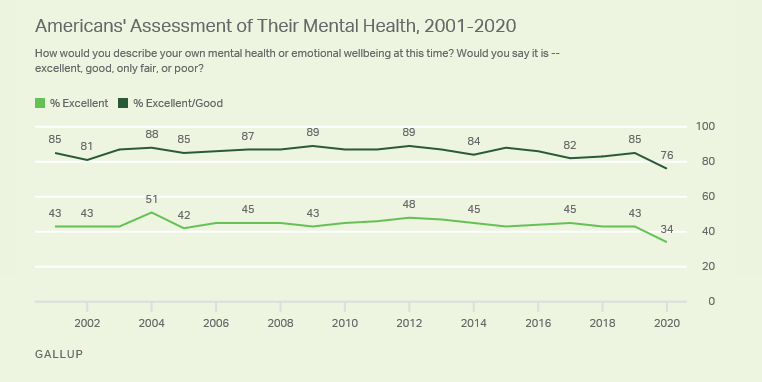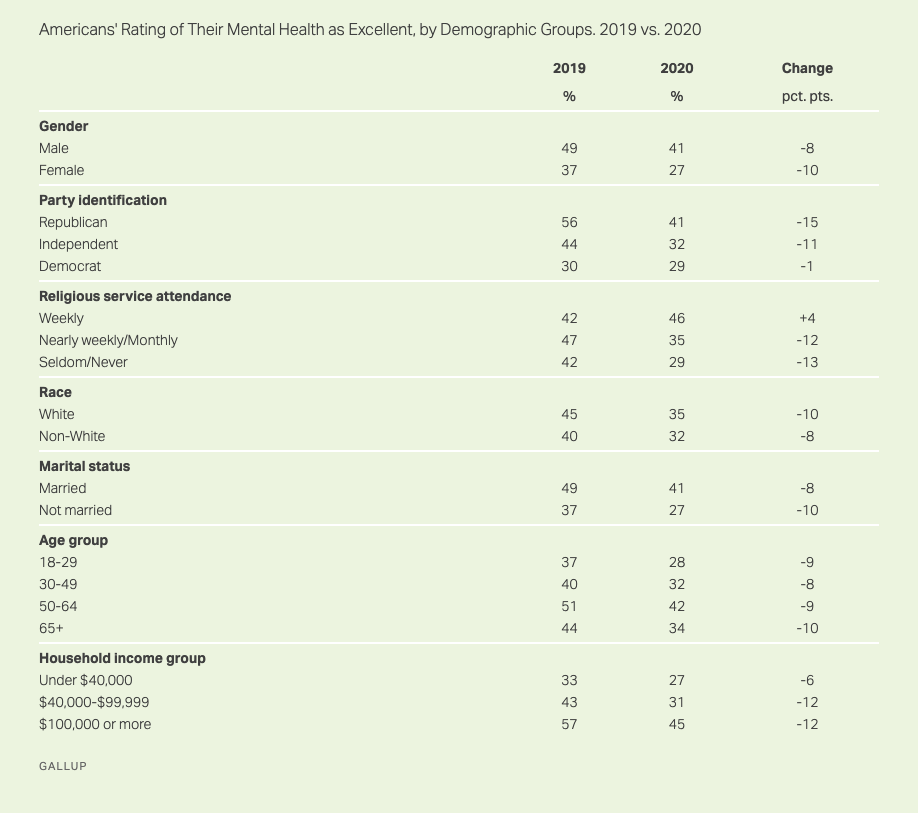
By Aaron Earls
After a tumultuous 2020, fewer Americans said their mental health was at least good than at any point in the past two decades. One group, however, stood in contrast to the declines across the board—weekly churchgoers.
Since 2001, Gallup has asked Americans to rate their own mental health or emotional wellbeing. The percentage who said it was good or excellent has ranged between 81% to 89% until dropping to 76% this year. There was little change in the self-reporting of Americans’ physical health.
Those describing their mental health as excellent has been between 42% and 51% since 2001. In 2020, that fell to 34%.
Still the majority of U.S. adults continue to rate their emotional wellbeing as positive. Yet around 1 in 4 Americans (23%) say their mental health is only fair (18%) or poor (5%).
The declines in personal mental health rating stretched across gender, race, marital status, age, income, and political affiliation. Weekly churchgoers are the only demographic group in which more say their mental health this year is better than 2019. Just under half (46%) say their mental health is excellent in 2020, compared to 42% in 2019.
Those who say they attend less frequently did not experience the same wellbeing stability. The percentage of near weekly or monthly churchgoers who rate their current mental health as excellent fell from 47% last year to 35% this year, a 12-point drop. Those who attend even less frequently (seldom or never) had a similar drop—42% in 2019 to 29% in 2020.
The drops among infrequent attenders means that in 2020, the more you attend church the more likely you are to rate your mental health as excellent.
Church and mental health
These statistics do not prove, however, that churchgoers do not experience mental and emotional health difficulties.
Multiple studies from Lifeway Research on mental health and the church demonstrate many in the pews struggle and could use help.
- 23% of pastors acknowledge they have personally struggled with a mental illness.
- 49% of pastors say they rarely or never speak to their congregation about mental illness.
- 27% of churches have a plan to assist families affected by mental illness.
- 65% of churchgoing family members of those with mental illness want their church to talk openly about mental illness.
- 59% of those actually suffering from mental illness say the same.
- 53% of churchgoers with mental illness say the church has been supportive.
- 76% of churchgoers say suicide is a problem that needs to be addressed in their community.
- 32% of churchgoers say a close acquaintance or family member has died by suicide.
- 80% of pastors say their church is equipped to assist someone who is threatening to take his or her own life.
- 92% of pastors say their church is equipped to care for the family that experiences the suicide of a loved one.
- 4% of churchgoers who lost a loved one to suicide say church leaders were aware of their loved one’s struggles.
- 68% of Americans feel they would be welcome in church if they were mentally ill.
- 35% of Americans say mental illness could be overcome with Bible study and prayer alone.
In a 2014 Lifeway Research project that included surveys of pastors, Americans diagnosed with mental illness, and family members of people diagnosed with mental illness, researchers found significant disconnects.
Few churches have a staff counselor skilled in mental illness, plans to assist families affected by mental illness, and training for leaders to recognize mental illness. The study also concluded there is a need for churches to communicate about available local mental health resources.
Unfortunately, Lifeway Research also discovered a stigma related to mental illness exists in churches, as does a culture of silence that leads to shame.
Still, the Gallup survey demonstrates the very real positive impact churchgoing can play on the emotional wellbeing of individuals.











